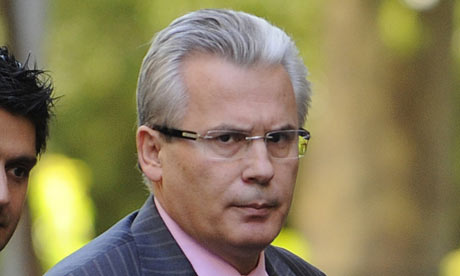Spanish justice on trial
The case of judge Baltasar Garzón underlines two major problems in Spain: a politicised judiciary and Franco's legacy
-

- guardian.co.uk, Friday 9 April 2010 12.00 BST
- Article history

Judge Baltasar Garzón is being investigated by Spain's supreme court, charged with ‘perverting the course of justice’. Photograph: Dominique Faget/AFP/Getty Images
Judge Baltasar Garzón's latest case once again involves a high profile defendant: himself. After making headlines around the world for going after the likes of Osama bin Laden, the late Chilean dictator Augusto Pinochet or Silvio Berlusconi, the Spanish judge will be sitting in the dock rather than presiding, charged with "perverting the course of justice".
The reason? He dared to launch an investigation of the crimes of the Francoist dictatorship that ruled Spain between 1936 and 1975 and carried out well over 100,000 summary executions without proper trial. And if you think this is odd just wait, there's more: the plaintiffs in this case are three far-right political organisations, among them Falange Española, none other than the old Fascist party, which is in fact credited with most of those atrocities Garzón was set to investigate.
Actually, he didn't really intended to investigate any atrocities at all, rather he was acting at the behest of victim's relatives who wanted to find and exhume their bodies. As I have written in a previous article, there are more mass graves in Spain than in Bosnia and still more missing persons than in Argentina. What Garzón did was to demand information about their possible murderers as a necessary step to searching for the corpses. Even this was too much.
Sounds bizarre? Truth be told, it actually makes a lot of sense. The case nicely encapsulates two serious failings in contemporary Spain. The first is the existence of a highly politicised and professionally incompetent judiciary. One of the two supreme court judges behind Garzón's prosecution, Adolfo Prego, often euphemistically described as "ultra-conservative", contributes opinion pieces to a pro-Franco magazine, while the other, Luciano Varela, is known for his professional enmity towards Garzón. The second problem this case also exposes is, of course, the eternal, unresolved question of General Franco's place in Spain's collective memory.
Yes, Franco died in bed, and the transition towards democracy was piloted by a group of young Francoists and a king who had been appointed by the General (skipping his father, the actual heir to the crown). True, the opposition went along with it, mostly for fear of a military coup (which happened anyway, and failed). But whatever the merit of the choices made back then, a dangerous myth was born: that Francoism's lack of accountability was the price to pay for having a democracy, while democracy is all about accountability. The fact is that since then we have moved into a different world, one in which human rights abuses should always be investigated, no matter the arrangements made by the perpetrators. One of those arrangements could be the 1977 amnesty law, which is at the heart of the Garzón case. In the interpretation of judges Prego and Varela, that law grants a blanket pardon for any political offence committed from the beginning of life on earth to that year of 1977, and Garzón, by ignoring it, would have abused his powers.
But, is it even true? No so sure. Jaime Sartorius, one of the proponents of the 1977 law has made it very clear recently that it had been intended only for the thousands jailed by the Francoists at the time, not for their jailers. It couldn't be otherwise, since the law related to the Francoist penal code, which, needless to say, didn't contemplate any crimes committed by the regime or its officials. Tellingly enough, pro-Franco lawmakers at the time refused to even take part in the drafting of the law and didn't vote for it. Sounds like strange behaviour if the law had been beneficial to them. It is true that the wording of the bill is so vague that it can be distorted to mean what it doesn't say (it doesn't even mention Franco or the Francoists), but Sartorius advises us to browse through the transcript of the debate held before its approval and realise for whom the amnesty was really intended.
And yet, should all this be of any importance? The 1977 law is pre-constitutional and a general pardon for crimes against humanity would be in contradiction with international treaties signed by Spain. That is why in 2008 the UN human rights committee demanded that it be scrapped on the grounds that it could lead to serious misunderstandings. And right they were. Only that it's not exactly a misunderstanding.
No hay comentarios:
Publicar un comentario